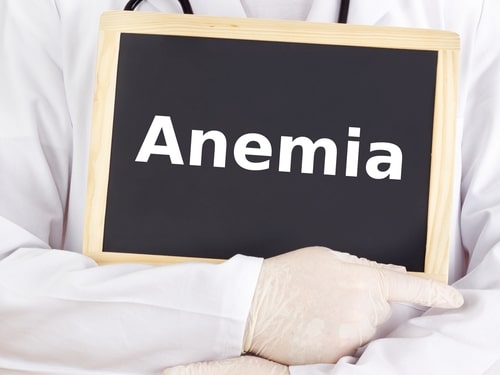 You’re feeling a little tired and less motivated to work out over the past few weeks. Plus, you’re more winded when you exercise and your heart rate is higher than usual. You blame it on overtraining and take a few days off.
You’re feeling a little tired and less motivated to work out over the past few weeks. Plus, you’re more winded when you exercise and your heart rate is higher than usual. You blame it on overtraining and take a few days off.
Exercise and Anemia: It May Not Be Overtraining
It could be overtraining that’s causing your fatigue, but there’s another possibility. You may be iron deficient. Iron deficiency anemia is not uncommon in athletes and people who work out regularly, especially young women. Athletes have a slightly higher requirement for iron for several reasons. When you work out vigorously and sweat, you lose a small amount of iron through their sweat. If you run or do high-impact exercise, the impact jars your kidneys and leads to microscopic blood loss that depletes iron.
There’s also the phenomenon of “heel strike anemia” in runners. This is iron deficiency anemia that comes from the force of the heels striking the ground during running. This compresses blood vessels in the feet and crushes red blood cells, leading to iron deficiency.
Women athletes are at higher risk for iron deficiency anemia because they lose blood monthly through their menstrual cycle. They’re also less likely to eat foods high in iron such as red meat. They also consume fewer calories. This can deplete iron stores and lead to iron deficiency anemia over time.
Keeping Track of Your Iron Level
The way doctors check for iron deficiency anemia is by measuring levels of hemoglobin in the blood. Not all cases of decreased hemoglobin are due to anemia. If you’ve just started running or doing endurance exercise, the volume of your plasma expands when you first start working out. This dilutes out your red blood cells, but it doesn’t affect exercise performance like iron deficiency anemia can.
Iron deficiency anemia can cause you to fatigue earlier during exercise and make you feel more short of breath. You may have nausea, be more irritable and feel generally run down. Visibly, you may appear pale and washed out. The problem is many of these symptoms are similar to those seen with overtraining, and many athletes don’t see their doctor to get a diagnosis.
Does this mean you should take an iron supplement if you work out? Not necessarily. If your iron levels are normal, there’s no reason to supplement with iron. Too much iron can build up in the liver. Some research suggests high iron levels contribute to heart disease. If you work out, it’s important to have your iron levels checked every 6 months to make sure you’re not deficient. This is especially true for young women and athletes who eat a vegetarian diet.
Exercise and Anemia: The Bottom Line?
A hemoglobin level is a good screen for iron deficiency anemia, but it doesn’t tell you high your iron stores are. A low ferritin level means you’re a few steps away from iron deficiency anemia and need to boost your levels. Ask your doctor to check a ferritin level along with a hemoglobin test if you’re concerned about iron deficiency anemia. Don’t be too quick to assume your symptoms are due to overtraining.
References:
Exercise Physiology. Fifth Edition. McArdle, Katch, and Katch. 2001.
Merck Manual. Eighteenth edition. 2006.

